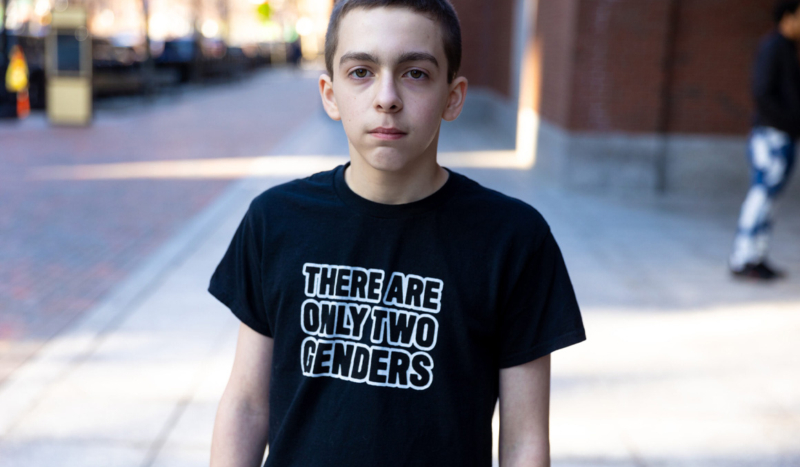
Alliance Defending Freedom photo
The US Supreme Court has chosen not to hear the appeal of a young Middleborough, Massachusetts student whose school banned him from wearing a t-shirt with the words, “There are only two genders,” and, following that, a shirt that said, “There are [censored] genders.”
In a 7-2 order issued Tuesday, the Court denied a petition to hear a challenge to the ruling by the US Court of Appeals for the First Circuit.
“Here, the school actively promotes its view about gender through posters and ‘Pride’ events, and it encourages students to wear clothing with messages on the same topic—so long as that clothing expresses the school’s preferred views on the subject,” asserted Alliance Defending Freedom (ADF), which represents Liam Morrison, who was 12 years old when he first asked the court to protect his First Amendment right to free speech in L.M. v. Town of Middleborough.
“We’re disappointed the Supreme Court chose not to hear this critical free speech case,” said David Cortman, ADF Senior Counsel and Vice President of US Litigation.
Cortman cited Justice Samuel Alito’s lengthy dissent in which he lambasted the appeals court’s ruling, asserting it “departed from the standard” set by the Supreme Court in similar First Amendment cases.
Alito accused the First Circuit of using a “vague, permissive, and jargon-laden rule,” which did not follow student free speech rights as established in the landmark 1969 Supreme Court ruling in Tinker v. Des Moines Independent School District.
In that case, the Court ruled students’ free speech rights may only be restricted if their conduct significantly disrupts school activities. In Tinker, the Court ruled students were able to wear black armbands to protest the Vietnam War since that behavior did not interfere with school activities.
“We should reaffirm the bedrock principle that a school may not engage in viewpoint discrimination when it regulates student speech. Tinker itself made that clear,” Alito wrote. “Curiously, however, the First Circuit declined to follow Tinker in this regard, instead cherry-picking which First Amendment principles it thought worthy of allowing through the schoolhouse gates.”
“By limiting the application of our viewpoint-discrimination cases, the decision below robs a great many students of that core First Amendment protection,” the justice added.
As Liam detailed in a video that premiered in October 2023, his school – like many other public schools throughout the country – had not held back in expressing its own views on various political issues.
“My school’s annual pride month celebration is a pretty clear example,” he said. “My school spends all of June expressing its view on LGBTQ+ issues, and school officials encourage us to wear our pride gear to celebrate pride month.”
Liam explained his school’s administration “believes that a person’s status as a male or female, or something else, depends only on what they feel themselves to be, and not at all on biology.”
“Like my teachers and principal, I have beliefs too,” he continued. “I’m not shy about sharing them. I believe there are only two sexes, male and female, and I believe what we call a person’s gender, whether someone is man or woman, boy or girl, has everything to do with whether their sex is male or female. This view is backed up by science, and even though the administrators at my school would like me to think I’m alone in holding this view, I know I’m not.”
When Liam wore his t-shirt with the words “There are only two genders” on it, his principal called him into her office and told him he needed to change his shirt because its words “might make some students feel unsafe.” When Liam said he did not wish to change his shirt, the principal called his father and asked him to take his son home.
“Even at 12 years old, I have my own opinions, and I have a right to express those opinions even at school,” Liam asserted in the video. “This right is called free speech. It’s protected by the First Amendment to the Constitution.”
Nevertheless, in June 2024, the appeals court ruled in favor of the school district. In October, ADF followed up by asking the Supreme Court to hear Liam’s case.
As the petition stated, “Middleborough bombarded L.M., a middle school student, with messages promoting its view that sex and gender are self-defined, limitless, and unmoored from biology.”
“Seeing these ideas false and harmful, L.M. responded by donning a ‘There are only two genders’ t-shirt expressing his differing view and, after Middleborough suppressed that shirt, wearing a ‘There are [censored] genders’ t-shirt protesting censorship, which Middleborough banned too,” the petition continued.
“L.M. sought to participate in his school’s marketplace of ideas and address sociopolitical matters in a passive, silent, and untargeted way,” it explained further. “This Court’s review is urgently needed to reaffirm that … public schools can’t establish what is ‘orthodox in … matters of opinion,’ and students aren’t ‘confined to the expression of … sentiments that are officially approved.’”
In November, ADF announced in a press statement that “multiple education experts, free speech advocates, and 18 states have filed friend-of-the-court briefs with the U.S. Supreme Court that ask it to take the case.”
“Students don’t lose their free speech rights the moment they walk into a school building,” Cortman said. “Schools can’t suppress students’ views they disagree with. Here, the school actively promotes its view about gender through posters and ‘Pride’ events, and it encourages students to wear clothing with messages on the same topic—so long as that clothing expresses the school’s preferred views on the subject.”
“Our legal system is built on the truth that the government cannot silence any speaker just because it disapproves of what they say,” he asserted.
